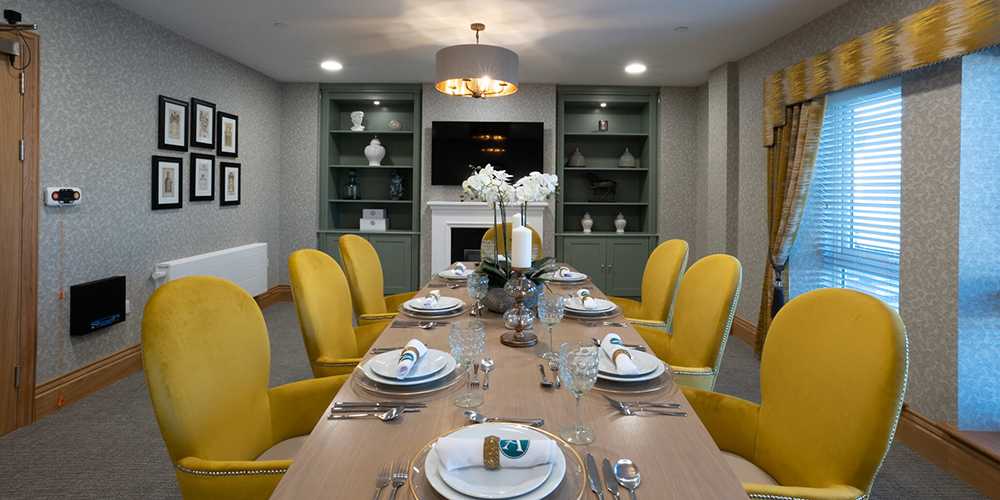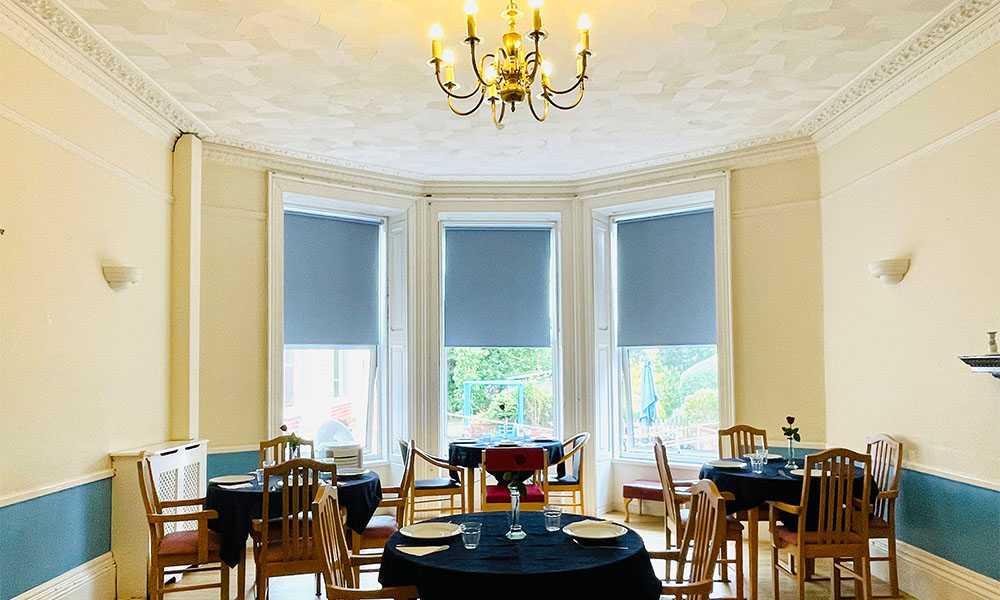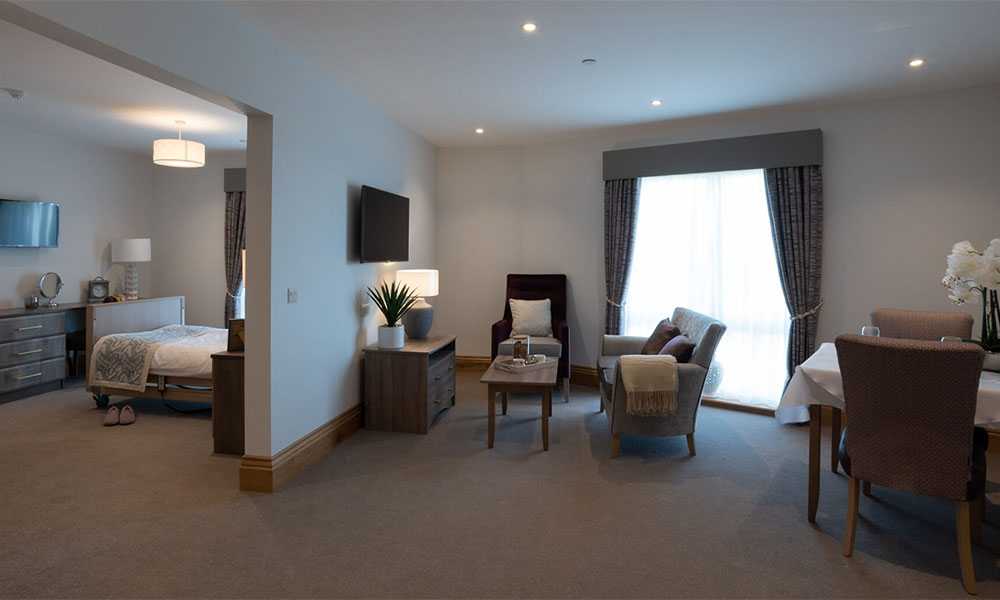Posted by Janine Griffiths
How to shortlist care homes in Exeter

Shortlisting a care home for a loved one isn’t just a practical task — it’s an emotional decision loaded with responsibility. If you’re looking at care homes in Exeter, chances are you’re already feeling the weight of choices, questions, and a growing to-do list. With so many options, how can you be sure you're focusing on the right ones?
This blog is here to help you cut through the noise and take control of the process. Shortlisting is not about rushing to a final decision — it’s about narrowing your focus in a way that makes the next steps clearer, calmer, and more confident. Whether you're planning ahead or making a decision under time pressure, this guide will show you how to quickly filter out unsuitable options and build a shortlist of care homes in Exeter that are genuinely worth considering.
Why live in Exeter?
When shortlisting care homes in Exeter, it’s worth remembering why so many people choose to settle here in later life. Exeter isn’t just a practical choice — it’s a place with real quality of life. From its peaceful green spaces to its well-connected location, the city offers a comforting balance of community, accessibility, and character.
Exeter combines the charm of a historic cathedral city with all the conveniences of modern living. Residents benefit from a wide range of local amenities including shops, GP surgeries, parks, and excellent hospitals such as the Royal Devon and Exeter Hospital. This level of healthcare infrastructure is particularly important when choosing a care home, ensuring continuity of care and fast access to medical support if needed.
The city’s manageable size makes it easy for families to stay connected. Whether loved ones are visiting from nearby towns or travelling down from further afield, Exeter’s strong road and rail links make it simple. And for residents themselves, Exeter offers a strong sense of place: a walkable city centre, riverside strolls, local events, and a pace of life that feels grounded and safe.
When considering care homes in Exeter, it’s not just the facilities inside the building that matter — it’s the lifestyle available outside, too. In this city, daily life can be both peaceful and well-connected, offering the kind of setting where residents can feel truly at home.
Step 1: Clarify the “non-negotiables”
Before you even start looking at individual care homes in Exeter, you need to know what absolutely must be in place for a home to be considered. These are your non-negotiables — the baseline criteria that ensure a home meets your loved one’s care needs, your budget, and your family’s priorities. Getting clear on this now saves time later and prevents you from getting distracted by glossy brochures or irrelevant details.
Start with the type of care required. Is your loved one living with dementia? Do they need round-the-clock nursing care, or would short-term, residential support be more appropriate? This single decision will immediately exclude a large number of homes that don’t offer the right type of support. Next, consider funding. Do you have a set weekly budget or local authority contribution to work within? Be realistic about what’s affordable — care fees vary significantly, even within the same city.
Then, think about location. Do you want a home in a specific part of Exeter — perhaps close to your house, public transport, or a hospital? Also, consider how soon a space is needed. Some highly rated homes may have long waiting lists, which may rule them out if time is tight.
Once you’ve set these filters — care type, budget, location, and availability — you’ll be left with a much smaller and more relevant pool of care homes. From there, the shortlisting process becomes far easier to manage.
Step 2: Deep dive into the details that matter
On the surface, many homes can look similar, but when you scratch beneath the marketing and polished photos, the things that truly shape daily life start to reveal themselves.
Staff turnover
Staffing levels and employee turnover are a great place to start. A home might look lovely, but if staff are stretched thin or constantly changing, continuity of care suffers. Ask how many carers are on each shift, and how long they’ve been part of the team. High turnover can be a red flag — a stable, well-trained team usually means residents are getting consistent, attentive support from people who know them well.
CQC Rating
You should also look at ratings from the CQC and read the actual inspection report before making your decision. As CQC ratings can sometimes be out of date pay careful attention to the date of the CQC rating and the language around dignity, responsiveness, safety, and how well the leadership supports its staff. A “Good” or “Outstanding” rating is reassuring, but the detail in the report will tell you how that rating was earned, and whether it aligns with your loved one’s needs.
OpenScore
An alternative way way of assessing a care home’s quality is Autumna’s OpenScore, which ranks care home providers on a number of factors, such as cost transparency, live reviews, infection control, dining choices and more. The score is made up from multiple data sources aggregated in real-time, enabling you to easily compare care homes with up-to-date and relevant information.
Specialist therapies
Then there are the specialist services and therapies that can make a real difference to quality of life. Does the home offer dementia-specific environments? Are there visiting physiotherapists or occupational therapists? Music therapy, sensory rooms, reminiscence activities — these extras may not be essential, but they can greatly enrich someone’s day-to-day experience, especially in residential and dementia care settings.
Person-centred care
Finally, dig into the softer but equally important areas: meal quality, personalisation, and flexibility. Can residents choose when and where they eat? Are meals home-cooked, nutritious, and adapted to individual dietary needs? Does the daily routine allow for personal preferences — or is there a one-size-fits-all schedule?
This deeper level of research takes a little more time, but it’s worth it. Because once the basics are covered, it’s these small but significant details that determine whether a care home just meets needs — or genuinely feels like home.
Step 3: Plan a visit or call with purpose
Once you’ve built a shortlist of care homes in Exeter that meet your essential criteria, the next step is to see how they hold up in real life. But don’t approach this step passively — this is your opportunity to engage directly, ask the right questions, and uncover how each home truly operates day to day. A visit or phone call can reveal things that no website or brochure ever could.
Go with clear goals in mind
Whether you’re booking an in-person tour or arranging a virtual visit, go in with a clear set of goals. This isn’t just about ticking a box or getting a feel for the décor — it’s about finding out how the home will meet the specific needs of your loved one. Ask about the care planning process: how are residents’ preferences, routines, and medical needs captured and reviewed? Find out how visiting works — are there set hours, or is the home open to more flexible family involvement?
Speak to the care team
Don’t be afraid to request a conversation with the care home manager or a member of the care team. Their openness and clarity can tell you a great deal about the culture of the home. Are they willing to answer your questions honestly? Do they show an understanding of the individual behind the enquiry? These interactions can give you a valuable sense of whether the home prioritises communication, compassion, and personalised care.
Move beyond first impressions
Visiting or speaking to a care home with purpose means moving beyond surface impressions and marketing language. It’s your chance to assess not just the service on offer, but whether the values of the home align with your family’s. And in a decision as important as this, purposeful engagement makes all the difference.
Section 4: The ‘tea and biscuits’ test
Sometimes, it’s not the paperwork or the policies that tell you the most about a care home — it’s the feeling you get the moment you walk through the door. That’s why we call this the tea and biscuits test. Ask yourself a simple but powerful question: Would I feel comfortable sitting here with a cup of tea and a chat? If the answer is no, it’s worth paying attention.
When you visit a care home, don’t just focus on facts and figures. Notice the atmosphere. Are you greeted warmly? Do staff seem engaged with the residents, or are they rushing from task to task? Is the environment clean, calm, and genuinely homely — or does it feel clinical and impersonal? And yes, trust your nose: does the home smell fresh and cared for, or are there persistent odours that suggest something’s not quite right?
This stage of the process is deliberately less clinical. It’s about tuning into your instincts and emotional cues — the things that often get overlooked but make a huge difference to someone’s daily life. Could you imagine your loved one feeling at ease here? Could you picture popping in for a visit and staying for a relaxed conversation over biscuits?
Shortlisting care homes in Exeter isn’t just about ticking boxes — it’s about choosing somewhere that feels right on a human level. So while the tea and biscuits test might sound simple, it’s often the clearest indicator of whether a place could truly feel like home.
Step 5: Refine your list
By this stage, you’ve done the groundwork — you’ve filtered for the essentials, explored the finer details, asked meaningful questions, and even trusted your instincts. Now it’s time to step back, take a breath, and refine your shortlist. You don’t need to make the final decision just yet. The goal here is to confidently narrow your options down to the top two or three care homes in Exeter that feel like genuine contenders.
Revisit your notes and consider what stood out — not just on paper, but in person or over the phone. Which homes seemed to understand your loved one’s needs without you having to explain twice? Which ones offered something special that resonated with your values or family priorities?
This is also a great time to separate the must-haves from the nice-to-haves. Perhaps you originally wanted a home with a private garden, but realised during your visits that a strong, personalised care plan matters far more. Or maybe a smaller, quieter setting felt unexpectedly reassuring. These realisations are important — they help shape not just your shortlist, but your confidence in the process.
Refining your list means bringing clarity to complexity. And when it comes to choosing from the many care homes in Exeter, clarity is everything. A carefully considered shortlist of two or three strong options gives you the space to compare meaningfully — and make the final decision with trust, not pressure.
Your curated Exeter shortlist – Autumna’s picks
Still feeling overwhelmed by the options? Don’t worry — we’ve done some of the hard work for you. Below is a handpicked selection of care homes in Exeter that meet high standards for care quality, availability, and transparency. Whether you're looking for specialist support or simply a welcoming place that feels like home, these standout choices are a strong starting point for your final shortlist.
Parkland House

If you're exploring exceptional care homes in Exeter, Parkland House by Peninsula Care Homes stands out for its warm, homely atmosphere and thoughtful attention to detail. Nestled in a quiet residential area, this dementia-specialist home offers beautifully designed communal spaces, including sensory gardens, a retro-themed lounge, and cosy nooks that encourage meaningful connection.
Residents enjoy restaurant-quality meals tailored to individual preferences, and activities are genuinely person-centred — from music and arts to reminiscence therapy. With high staff-to-resident ratios and an ethos rooted in dignity and choice, Parkland House is ideal for those seeking not just care, but a nurturing, stimulating lifestyle.
Lucerne House

Lucerne House by Barchester Healthcare is a standout choice for those looking for a mix of luxury and exceptional care. Located in a peaceful area, this modern home offers spacious, beautifully furnished rooms, each thoughtfully designed to enhance comfort and privacy. Lucerne House provides high-quality care for a range of needs, including residential, nursing, and dementia care, with a focus on person-centred support.
The home boasts excellent facilities, including a private dining area for family gatherings, engaging activities tailored to individual preferences, and beautifully landscaped gardens for relaxation and socialising. The dedicated staff at Lucerne House go above and beyond to ensure residents feel truly at home, making it an ideal option for families seeking peace of mind and the highest standard of care.
Green Tree Court

For those exploring premium care homes in Exeter, Green Tree Court offers an experience that truly stands apart. Known for its hotel-style interiors and five-star attention to detail, this award-winning care home blends clinical excellence with luxury living. Each spacious, beautifully designed suite includes a private lounge area, with many overlooking landscaped gardens.
Residents enjoy chef-prepared meals served in a bistro-style dining room, an in-house salon and spa, and a music room complete with a grand piano. Green Tree Court also offers 24/7 nursing care and bespoke care plans, making it ideal for those needing both comfort and comprehensive support. If you’re seeking a home that prioritises both wellbeing and lifestyle, Green Tree Court is a must-see.
Alexander House

If you're looking for a truly personal and elegant care experience, Alexander House Care Home offers boutique-style living with a warm, family feel. Set in a beautifully converted period property, this independently run home combines classic charm with modern comforts. Residents enjoy cosy communal spaces designed for relaxation and connection, individualised care and a homely atmosphere. The team is known for going above and beyond—tailoring everything from meal preferences to daily routines. With regular live entertainment, wellbeing-focused activities, and home-cooked food, it’s a place where residents feel genuinely valued and at home.
Cadogan Court

One of the most well-regarded care homes in Exeter, Cadogan Court is run by the Royal Masonic Benevolent Institution Care Company and offers a tranquil, high-quality environment designed for comfort, dignity, and independence. Set within beautifully maintained grounds, this purpose-built home features spacious ensuite rooms, elegant lounges, and a bright, welcoming dining area.
What makes Cadogan Court truly stand out is its attention to lifestyle as well as care. Residents benefit from tailored support, a varied activities programme, and access to an onsite hair salon, therapy room, and landscaped sensory gardens. Whether you're seeking residential, dementia, or respite care, Cadogan Court delivers it with professionalism and warmth in equal measure.
Looking for care homes in Exeter? Autumna can help!
Searching for the right care home can feel overwhelming—but you don’t have to do it alone. Whether you're just starting out or refining your shortlist, Autumna is here to make the process simpler and more transparent.
All you have to do is head over to the search bar on our website, select the type of care you need and type in your location to view a list of care homes. You can also use our shortlisting tool and answer a few questions to receive an even more bespoke list of care homes tailored to your circumstances.
Our expert team can guide you through your options, provide independent advice, and even help you understand funding or specialist care needs. With detailed information on hundreds of care homes in Exeter, including availability, CQC and OpenScore ratings, and the unique features that matter to you, we take the stress out of decision-making.
If you need to speak with someone, you can call Autumna’s friendly advice line on 01892 33 53 30—free, impartial, and designed around your needs.
Receive a Free Care Home Shortlist!
Let our expert team of advisers get your search off to a great start.
Tell us a little about your needs and we'll send you a bespoke shortlist of care homes! Click the button below to begin, it takes just a few minutes.
Other articles to read
From the blog

Older Persons Care Advice
How to shortlist care homes in Exeter
April 17th, 2025
Looking for an adult day care centre near you? Discover how to find safe, joyful care for your loved one—and support for yourself—on Autumna.

Older Persons Care Advice
What is Discharge to Assess?
April 16th, 2025
Discover how Discharge to Assess (D2A) supports faster recovery, reduces hospital stays, and how Autumna helps simplify finding the right care.

Older Persons Care Advice
What are the benefits of person-centred care?
April 9th, 2025
Discover the benefits of person-centred care—from improved wellbeing to better outcomes—for individuals, families, and care providers alike.
Frequently Asked Questions
An adult day care centre is a safe, structured space where older adults or those living with conditions like dementia can spend their day with support, activities, and companionship.
Start by considering their needs—quiet vs. social, health support, cultural preferences—then use Autumna’s filters to find centres that meet those specific needs.
Some are funded by local authorities (after an assessment), while others are privately paid. Autumna can help you understand funding options and compare costs easily.
Many adult day care centres offer trial days, so your loved one can get a feel for the environment before making a decision. It’s a great way to ease into care.
The UK's largest & most detailed directory of elderly care and retirement living options
10,434
Care Homes
12,399
Home Care Services
1,670
Live-in Care Services
1,826
Retirement Living Developments
Autumna is the UK's largest and most comprehensive later-life living & elderly care directory. Our detailed search facility and team of expert advisors can help you find the best care homes, nursing homes, retirement homes, retirement villages, home care, and live-in care services for you or your loved one's needs. Our website is free to use, we are proudly independent, and we never take referral fees.






